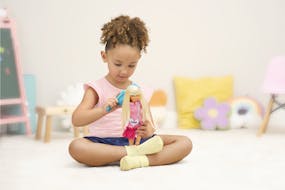After nine months of weird and not-so-wonderful things happening to your body, and the marathon that is labour, you’d think you deserve a break. Sadly, nature has other plans ...
This page contains affiliate links, which means we may earn a small amount of money if a reader clicks through and makes a purchase. All our articles and reviews are written independently by the Netmums editorial team.
It's not over until the placenta's out ...
Hooray, your baby's out; time for a rest, right?
Er, no. Before you tuck into your postnatal tea and toast – officially the best meal you’ll ever eat! – you need to deliver the placenta.
You’ll be offered an injection of syntocinon to encourage your uterus to contract, and with a bit of help from the midwife, the placenta should be out within 10 minutes or so.
FREE NEWBORN NAPPIES
You may need sewing up ...
The thought of having stitches down below probably makes your toes curl, but it’s very common to need stitching up after giving birth, either because you’ve torn during the delivery or have had an episiotomy (a cut to the perineum to make it easier for your baby to come out).
The stitches might be done in the delivery room, although more complicated repairs will need a trip to theatre.
You’ll probably be sore for two or three weeks, and the stitches should dissolve within a month.
You still get pains ...
Thought your contractions would stop after giving birth? Not always.
Over the next few weeks your uterus will shrink back to its pre-pregnancy size, and this can cause strong cramps, similar to intense period pains.
These after pains tend to be worse if you’ve had a baby before, and step up a gear while you’re breastfeeding.
The good news? They usually only last two to three days.
You feel like the Michelin Man ...
Don’t be surprised if you resemble the Michelin Man in the days after giving birth.
Your body is full of the excess fluid it produced in pregnancy, and this can lead to your feet, ankles and fingers ballooning.
It should only last a few days, but until it passes, flip-flops are your new best friend.
You dread going to the loo ...
As if the thought of your first postnatal poo isn’t scary enough, lots of us become constipated after giving birth.
It often takes a day or two before your bowels get back to normal – and a little longer if you’ve had a caesarean.
Drinking plenty of water and eating high fibre foods like fruit and veg can help, but if you’re really bunged up, ask your midwife about a laxative.
You suddenly get piles ...
Don’t be surprised if you develop piles after the birth, even if you didn't suffer with them during pregnancy. You've got all the straining and pushing during labour to thank.
They usually shrink back within a few days, but if they’re really uncomfortable, talk to your midwife about treatments.
You'll bleed for ages ...
Imagine the mother of all periods, and you’ll get an idea of the sort of bleeding you can expect after the birth.
It’s called lochia, and at first it’ll be super-heavy, so stock up on the biggest maternity pads you can find.
It’ll gradually become lighter and brown rather than red in colour, until it peters out completely after about six weeks, although some new mums are luckier and stop bleeding after a couple of weeks.
You often bleed more during breastfeeds; this is normal, but if it gets heavier at other times or you pass clots, speak to your midwife.
You can't EVER imagine wanting to have sex again ...
Sex is likely to be the last thing on your mind right now, but don’t be surprised when the midwife gives you the contraception chat.
You can become fertile again soon after giving birth, so while it might seem crazy to be talking about contraception, it’s well worth thinking about what you’ll do when (or if!) you’re ever ready to have sex again.
You leak (and fart) a lot ...
No matter how many pelvic floor exercises you’ve done, it’s normal for your bladder control to disappear after the birth.
And that’s not all; you might find yourself farting involuntarily too.
Embarrassing, much?
Keep up with the Kegels and things should improve with time, but if you’re still leaking after three months, your doctor might refer you for physiotherapy.
Your boobs grow and grow (will they ever stop?) ...
If you thought your boobs had got bigger in pregnancy, you ain’t seen nothing yet. When your milk comes in, usually two or three days after the birth, you can expect your breasts to grow to epic proportions, and to feel rock hard and tender, too.
This will settle as your baby gets used to breastfeeding, or after several days if you’re not going to breastfeed, but until the engorgement passes, try warm showers or chilled breast pads to ease the discomfort.
You'll sweat significantly ...
Waking up drenched in sweat is another delightful feature of the postnatal period. Your body needs to get rid of the extra fluid it produced in pregnancy, and that means night sweats. This can last for several weeks – longer if you’re breastfeeding. Sleeping on a bath towel can help you avoid having to change the bed sheets every night.
The littlest thing makes you blub ...
The emotional rollercoaster of pregnancy is nothing compared to what you’ll go through after the birth. One minute you’re crying happy tears as you gaze at your sleeping baby; the next, you’re wailing with despair because life will never be the same again.
The so-called baby blues tend to peak between three and five days after giving birth, but if you’re still feeling dreadful after six weeks, it’s worth having a chat with your doctor or midwife about postnatal depression.
You feel phantom kicks
This is an odd one but many mums say they feel phantom baby kicks long after their baby has been born.








